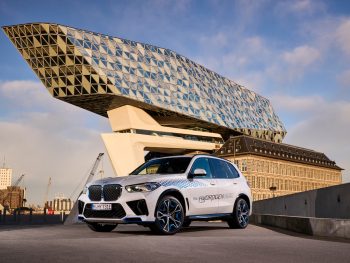BMW forms iX5 Hydrogen pilot fleet
BMW is continuing its work to bring hydrogen cars to the road by forming its pilot fleet for the iX5 Hydrogen.
The carmaker started small-scale production of the fuel cell EV in late 2022 at its Munich Research and Innovation Centre and will start running them as technology demonstrators in selected regions this spring.
First unveiled as a concept at the IAA show in 2019, the iX5 Hydrogen is built on the standard X5, supplied by BMW’s Plant Spartanburg in the USA, but adapted to accommodate two hydrogen tanks, electrical systems, battery, electric motor, plus fuel cells from Toyota under the carmakers’ alliance.
The car stores the hydrogen needed to supply the fuel cell in two 700-bar tanks made of carbon-fibre reinforced plastic (CFRP). Together these hold enough to give a range of 504 km (313 miles) in the WLTP cycle while refuelling takes just three to four minutes, as with a conventional ICE.
Maximum output of the overall drive system is 401hp and the iX5 Hydrogen races from 0-100km/h (62mph) in less than six seconds and with a top speed of more than 180km/h (112mph).
BMW remains coy about specifics for the test but said it will run a fleet of under 100 vehicles, which will be used internationally for demonstration and trial purposes for various target groups.
The real-world trials are seen as an “important next phase” to deliver valuable knowledge that will then pave the way for potential series production.
CEO Oliver Zipse said: “Hydrogen is a versatile energy source that has a key role to play in the energy transition process and therefore in climate protection. After all, it is one of the most efficient ways of storing and transporting renewable energies. We should use this potential to also accelerate the transformation of the mobility sector. Hydrogen is the missing piece in the jigsaw when it comes to emission-free mobility. One technology on its own will not be enough to enable climate-neutral mobility worldwide.”
The carmaker added that FCEV technology will contribute to decarbonisation and referred to report by the International Energy Agency (IEA), which says hydrogen offers considerable potential as a future energy source in connection with global energy transition activities.
BMW asserted that for transport, hydrogen can become a further technology option, alongside battery-electric mobility, for shaping sustainable individual mobility in the long term.
But it also noted the need for “competitive production of sufficient quantities of hydrogen from green power, as well as expansion of the corresponding filling infrastructure, which is already being intensively pursued in many countries”.
With such conditions in place, the group has said that hydrogen fuel cell technology has the potential to become a further pillar in its drivetrain portfolio for local CO2-free mobility.








